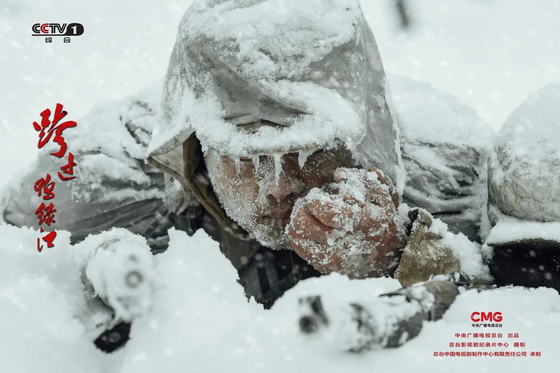![A scene from the drama'Across the Yalu River,' glorifying China's involvement in the Korean War. [CC-TV 캡처]](https://i0.wp.com/pds.joins.com/news/component/htmlphoto_mmdata/202101/25/c72c7054-76fc-4f11-81f1-c0b0c9a03ff8.jpg?w=560&ssl=1)
A scene from the drama’Across the Yalu River,’ glorifying China’s involvement in the Korean War. [CC-TV 캡처]
On the 24th, the 40-part drama “Crossing the Yalu River (跨過鴨綠江)” ended on the 24th.
6·25 Chinese Army US Hwa 劇’Across the Yalu River’ finishes first in the ratings
GPA 8.7 “Respect for history” instilled distortion of the Korean War
100 Praise Works Waiting for the 100th Anniversary of the Communist Party
The Korean-Chinese translation site also… “China should ask for correction”
The drama was made from the perspective of’anti-American aid’ (a Chinese expression of the Korean War that helped North Korea fight the United States). It focused on emphasizing the’Imperial America’ and emphasizing the’heroic activity’ of the Chinese military to face it. In the 21st episode, which aired on the 12th, which dealt with the 1·4 retreat, a representative statement is that the commander of the U.S. military cut off the main road and ordered a fire on refugees who do not follow the order.
However, the drama did not mention the pain suffered by the Korean people due to the North Korean invasion of the South, followed by China’s intervention and the 1·4 retreat. Even throughout the drama, the North Korean military is not seen at all. A local official said that it was because of the North Korean protest. The Korean army is depicted as a helpless enemy.
Instead, North Koreans and Koreans who help Chinese troops appear everywhere. In the 20th episode, which aired on the 12th, a Korean ambassador, “Let’s eat rice cakes from the reinforcement army,” by an aunt in Hanbok, was aired as it was. The Chinese military also replied, “Mother, I will come back and eat again after winning the war.” This is the version of the Cold War period film “Heroic Girl (1964)” and “Sanggamyeong (1956).”
The evaluation of the drama in China is a tribute. The’Beijing Youth Report’ reported on the 15th that “According to the CSM national network, the audience rating research institute, the average viewership share of’Alu River’ is 5.29%, and the highest viewership rating is 6.78%.” On the 25th, the netizen rating of The Wooban, a movie reputation site, recorded 8.7. The newspaper praised “the whole story is close to the facts,” and “respecting the history, respecting the other person, and the shock of the truth is as good as a documentary.” The state-run Shinhwasa said on the 19th that it was “a work that raised the level of the Joo Seon-yul film and made history illuminate the future.” Joo Sun-yul is a film made with the aim of promoting the system and inspiring patriotism.
The same is true of the evaluation of Chinese netizens on The Wooban. ID Isaotang (一勺湯) evaluated the Yalu River as “a cultural strategy of the US-China uprising.” Another netizen said, “The history is surprisingly similar when you look at the’mistakes’ of the United States at the time and the crazy attempts of today.”
China’s propaganda authorities have put a nationwide quantity into the Yalu River despite Corona 19. The director of the production was Seon Hai-siung (54), president of the Central Radio TV Headquarters (中央廣播電視總臺). On August 15th last year, I entered Crankin and finished filming for the 40th part in 4 months. Four fighters, nine tanks, and 1,000 guns were specially produced, and 375 actors and 80,000 bullets were put in.
China’s distortion of the Korean War began in earnest in 2010 from the speech of vice-president Xi Jinping at the time of the 60th anniversary of anti-US aid. At the time, Xi argued, “The great anti-US aid war is a just war against aggression and keeping peace.” The Korean War was a’civil war’, which is the logic that the US tried to intervene imperialism and China prevented it. At the 70th anniversary conference held on October 23 last year, he claimed victory, saying, “The Chinese and Korean troops beat the US military’s invincibility myth, and drove the Ahn-Hamu-in invaders to sign the Armistice Agreement.”
China’s anti-US aid launch is expected to continue this year. On July 1st, we mark the 100th anniversary of the founding of the Chinese Communist Party. At the National Propaganda Bureau’s meeting held in Beijing on the 6th, Wang Huning, a politician’s politician, instructed, “Put all the powers of the front into a propaganda education to celebrate the 100th anniversary of the founding of the CCP.” The Central Propaganda Department is scheduled to air more than 100 dramas commemorating the 100th anniversary of its founding, recently reported by Hong Kong Myungbo. The’Yamnok River’ is just the beginning.
However, the Korean government is consistent with such a passive response to the’Korean War Fair’. The bigger problem is that even some Koreans are introducing China’s arguments to Korea without any criticism. Former Dongguk University professor Kang Jeong-gu (76), who insisted on the’June 25 is the War of Unification’, published in an Internet newspaper called Unification News last year in China’s Global Times, “Strengthening and Progress with the Spirit of Anti-US Aid” and “The Korean War and the Anti-US Aid War. What is different” was introduced as it was translated.
Cha Jae-bok, a research fellow at the Northeast Asian History Foundation, said, “China continues to politicize history in accordance with the close relations between North Korea and China and the US and China, even though the People’s Daily SNS media admitted North Korea’s invasion of the Korean Peninsula. It is desperate to try to correct through various channels without being silent.”
Beijing = correspondent Shin Kyungjin [email protected]
